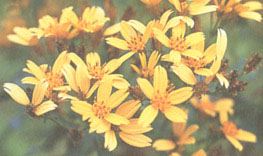
Koʻokoʻolau Flowers
- Ku aku la ʻoe i ka malanai
- A ke Kīpuʻupuʻu
- Nolu ka maka o ka ʻohawai a uli
- Niniau ʻeha ka pua o Koaiʻe
- ʻEha i ke anu
- Ka nahele ʻo Waikā
- A ke Kīpuʻupuʻu
- Hui:
- Aloha Waikā iaʻu me he ipo la
- Me he ipo la ka makalena
- ʻO ke Koʻolau
- Pua i ka nahele ʻo Mahuleia
- E lei hele i ke alo ʻo moʻolau
- Me he ipo la ka makalena
He lau ka huakaʻi hele i ka pali loa- He lau ka huakaʻi hele i ka pali loa
- A he aloha e, a he aloha e
- A he aloha e, a he aloha e
- Hele hihiu pili noho i ka nahele
- O kuʻu noho wale iho no i kahua e eʻi
- Ahe aloha e e
- O kou aloha ka i hiki mai ioʻu nei
- Mahea la ia i nalo iho nei
- He lau ka huakaʻi hele i ka pali loa
Smitten art thou
With the blows of love
Luscious the water-drip in the
wilds
Wearied and bruised is the
flower Koaiʻe
The herbage of Waikā
Chorus:
Waika loves me as a
sweetheart
Dear as my heart, the yellow
eye
Of Koʻokoʻolau
My flower in the tangled wood,
Mahuleia
A travel wreath to lay on
love's breast
A shade to cover my journey's
long climb
A shade to cover my journey's
long climb |
And this, it is love
And this, it is love
Love-touched, distraught, mine a
wilderness home But still do I cherish the old
spot
For love, it is love
Your love visits me even
here
Where has it been hiding till
now
Source: Translated by Robin Makua - Waikā is taken from the ancient chant "Hole Waimea", a name song for Kamehameha I, inherited by his son, Liholiho. This is the tale of the Kipuʻupuʻu, a band of runners whose name was taken from Waimea`s pelting rain. Malanai is the gentle breeze. They were to be trained in spear fighting and went to Mahiki in Waimea, a woodland haunted by demons and spooks. There they would hole (strip), the bark of saplings to make spears. Hole also means to handle roughly or caress passionately. In the forest they sang of love, not of work or war. Pua o Koaiʻe is the fragrant blossom of the Koaiʻe tree that grows in the wild, and is an euphemism for the delicate parts of the body. Koʻolau is a contraction for the yellow flower or yellow eye (maka lena) of the koʻokoʻolau plant, used to brew tea. Moʻolau and hulilau (slang) is used figuratively for a woman's breasts. Pololo is a combination of 2 words: pō (night) and loloa (long), with the last "a" dropped. This form of speech is called kepakepa. Ulumano is a violent wind that blows in the night on the western side of Hawaiʻi. Kamehameha I's troops were wrecked by this wind off Nawawa. There, a whole village was burned to light the way to the shore. Aʻe is a violent wind that blows from different points in succession, or a circular storm. Waluihe is for the 8 spears that are applied to this wind as it struck from 8 different points. This phenomena was observed by ancient Hawaiians. Holiʻo is the name of a wind with entirely different characteristics from the two aforementioned. Hanakahi is a district on the Hamakua side of Hilo, named for a chief whose name means profound peace. Set to music by John Spencer, this mele is full of eupheisms and double entendre or kaona that is reminiscent of Hawaiian poetry. The story, as told by Lawrence Neula and his niece, Lorna Lim, is that John Spencer was near Kohala when the music came to him. He began searching desparately for a piano, and finally found one in the home of Maryann Lim of Kohala, where this mele was first played.